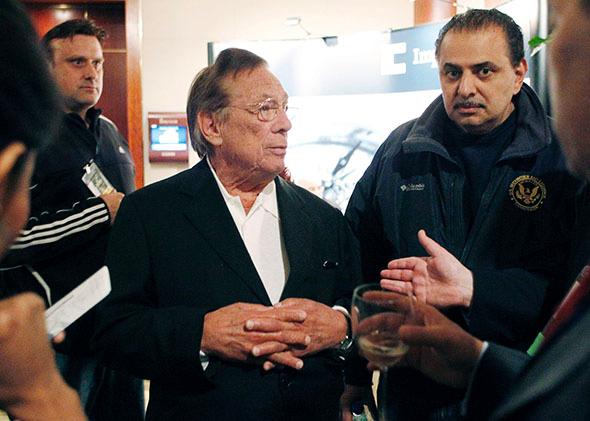NBA Commissioner Adam Silver did not hedge. There was nothing indefinite in his statement on Tuesday afternoon, no plea for patience while the league gathered more information. Donald Sterling has been banned from the NBA for life, no caveats, and Silver will urge Sterling’s fellow owners to push for the Clippers boss to sell his team.
This is a dramatic turnaround from the NBA, a league that has tolerated Sterling’s bigotry for decades. On Monday I noted that Sterling said the following about his Clippers players in recordings released by Deadspin and TMZ: “I support them and give them food, and clothes, and cars, and houses. Who gives it to them? Does someone else give it to them?” In describing these remarks, I wrote that Sterling views the men on his roster “as tenants on a basketball plantation.” This analogy isn’t just supported by words Sterling said to his girlfriend. It’s been Sterling’s modus operandi for years, and the NBA is only now doing something about it.
Bring out the word plantation in the context of sports, and you’re guaranteed to make a lot of people very angry. When Bryant Gumbel described former NBA Commissioner David Stern as a “modern plantation overseer,” Silver, the current commissioner, described those comments as “outrageous.” In 2011 Jeffrey Kessler, an attorney for the players during the league’s contentious labor negotiations, said the NBA was treating players like “plantation workers.” In response, Stern described Kessler as “the single most divisive force in our negotiations,” adding that his “conduct is routinely despicable.”
You don’t need to be a scholar of American history to critique the plantation comparison. NBA players make a lot of money. The owners of basketball franchises also don’t literally own their players. As the New York Times’ William Rhoden argues in his book Forty Million Dollar Slaves, “money does not necessarily alter one’s status as ‘slave,’ as long as the ‘owner’ is the one who controls the rules that allow that money to be made.” Still, I don’t believe it’s fair to label any NBA commissioner a plantation overseer, an analogy that—in that case—trivializes slavery.
I agree with Taylor Branch, the historian best known for his trilogy on the civil rights movement, America in the King Years. “Slavery analogies should be used carefully,” Branch writes in his 2011 Atlantic piece “The Shame of College Sports.” He continues, “College athletes are not slaves. Yet to survey the scene—corporations and universities enriching themselves on the backs of uncompensated young men, whose status as ‘student-athletes’ deprives them of the right to due process guaranteed by the Constitution—is to catch an unmistakable whiff of the plantation. Perhaps a more apt metaphor is colonialism: college sports, as overseen by the NCAA, is a system imposed by well-meaning paternalists and rationalized with hoary sentiments about caring for the well-being of the colonized.”
I don’t recall any prominent criticisms of Branch’s plantation/colonialism comparison, most likely because college sports are objectively terrible, what with the schools making millions while the athletes don’t get paid. (And no, scholarships do not equal cash.) In the case of Sterling, the plantation comparison has less to do with dollars and cents than with how he views black people.
It’s not just that Sterling said he gives his players “food, and clothes, and cars, and houses.” As Yahoo’s Adrian Wojnarowski writes, Sterling “has an absolute plantation prism with which he sees players: He always preferred long, strong, physical players. To him, that’s a basketball player: Big, black and strong.” Wojnarowski goes on to report that Sterling nearly scuttled the team’s agreement with white shooting guard J.J. Redick because, in the words of a source, “He thought it was too much to pay for a white player.”
Elgin Baylor, the Clippers’ longtime general manager, laid out Sterling’s plantation mindset in a 2009 employment discrimination lawsuit. Baylor, an African-American, accused Sterling of saying he “wanted the Clippers team to be composed of ‘poor black boys from the South’ and a white head coach.” (In the years hence, Sterling did bring in Doc Rivers to coach the team, so I guess that’s some kind of progress.) Baylor also alleged that Sterling told Clippers draft pick Danny Manning, in the presence of David Stern, that he was “offering a lot of money for a poor black kid.” (The racism claim was dropped from Baylor’s lawsuit before the trial, and a jury ultimately rejected Baylor’s age discrimination claims.)
I agree with my colleague Jamelle Bouie, who argues that Sterling’s private racism is far less important than the fact that he acts on his views. Those actions include pervasive, long-running housing discrimination, including a refusal to rent to blacks and Hispanics. Sterling’s behavior, too, includes treating the employees of his NBA team as a resource to exploit, a class of people that needs to be overseen and can be taken advantage of.
If you don’t catch a whiff of the plantation here, your nose is broken. It’s about time the NBA caught the scent, and gave Sterling the punishment he’s long deserved.
